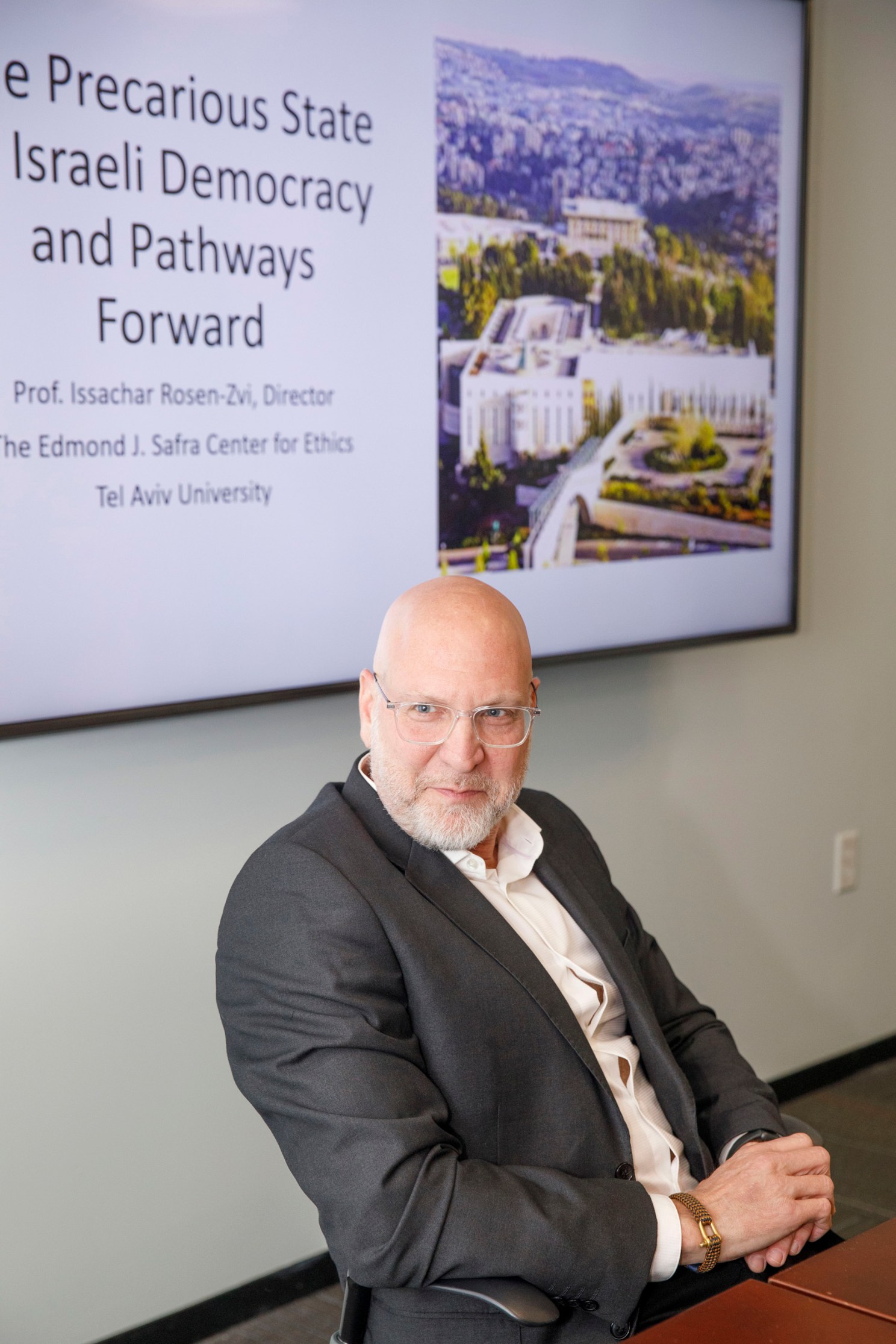
Issachar Rosen-Zvi, director of the Edmond J. Safra Center for Ethics at Tel Aviv University.
Kris Snibbe/Harvard Staff Photographer
Examining the duality of Israel
Expert in law, ethics traces history, increasing polarization, steps to bolster democratic process
Israel is a Jewish state. Israel is a democracy.
“These two conceptions, nowadays, pull in divergent directions,” argued Issachar Rosen-Zvi, professor of law and director of the Edmond J. Safra Center for Ethics at Tel Aviv University.
In a recent lecture titled “The Precarious State of Israeli Democracy and Pathways Forward,” Rosen-Zvi spoke to this friction, which “risks compromising the fundamental principle of equality among citizens” in an era of rising polarization. His talk, held last month at Harvard’s Edmond & Lily Safra Center for Ethics, also covered recent controversial efforts to limit Israel’s Supreme Court as well as concrete steps for democratic renewal.
Judaism and democracy are what philosophers call “essentially contested concepts” with no consensus definition, Rosen-Zvi emphasized. Nevertheless, the two were in tension from the start. The word “democracy” does not appear in Israel’s Declaration of Independence, signed upon its founding in 1948. But the document contains language that calls for Jewish immigration while also establishing “complete equality of social and political rights to all its inhabitants irrespective of religion, race, or sex.”
Over time, attempts have been made to reconcile Israel’s Jewish and democratic identities, Rosen-Zvi said. He cited a 1995 decision by the Israeli Supreme Court, authored by Chief Justice Aharon Barak. Israel has no written constitution for the judges to scrutinize. But it does have a Basic Law, passed in 1992, which was drafted “to protect human dignity and liberty, in order to embed the values of the state of Israel as a Jewish and democratic state.”
Barak saw no “contradictory elements” between these conceptions, writing: “In my view, the concept of ‘Jewish’ should be understood at a high level of abstraction, one that unifies all members of society and finds common rights among them.”
That opinion also expanded the Supreme Court’s role, given the limits of that nation’s system of checks and balances. Most of the power resides in the Knesset, Israel’s parliament, which consists of a single chamber that selects the prime minister, passes laws, and oversees the government. It effectively serves as both legislative and executive branches.
“The conclusion was that the only check on the government’s power is a strong judiciary with the power of judicial review,” Rosen-Zvi said. The court could now strike down laws it deemed unreasonable.
Barak’s opinion elicited what the professor called “vehement backlash” from religious and nationalist camps on the Israeli right, culminating in judicial overhaul legislation, part of which was passed in July 2023 with the support of Prime Minister Benjamin Netanyahu and his ruling coalition.
“This reform proclaimed itself as seeking to restore power to the people, power that was allegedly usurped by the Supreme Court from the time of Aharon Barak,” said Rosen-Zvi, who clerked for the justice in the mid-’90s. “But the way they did it, it was clear they did not want to create a healthy democracy that brings power to the people. What they actually wanted to do was make sure the government is all-powerful.”
During the lecture, the legal scholar took a few minutes to outline the extent of polarization today, with new extremes reached by conservatives and liberals alike. He enumerated the recent history: five rounds of elections in three years following Netanyahu’s 2019 indictment on corruption charges.
“In November 2022, they now managed to form a government with extreme right and ultra-Orthodox parties,” Rosen-Zvi said.
Protesters took to the streets early last year to oppose the judicial overhaul. A contingent of reservists joined in, threatening to be no-shows for military duty. But the movement all but disappeared after the Hamas attack on Oct. 7.
Late last year, the Supreme Court used its judicial review powers to strike down the reform law.
How to advance democracy in the face of these compounding challenges? Rosen-Zvi proposed five measures to mix and match should a new government be installed. Among them are formalizing a constitution, complete with a strong bill of rights, and strengthening checks and balances, perhaps by instituting two houses of parliament. Also mentioned was the urgency of ending the occupation of Gaza and the West Bank.
Rosen-Zvi, a scholar of local governments, spoke in more depth on the possibility of federalization, which would involve empowering the municipalities he studies.
It’s already happening on an informal level, he noted, due to the “vacuum” left by the current Israeli government. “This is not true for all localities; but this is true for several localities, the ones that are more powerful financially,” he said. His hometown of Tel Aviv provides just one example, with the city having partnered with neighboring communities to roll out bus service on Saturdays, which is the Sabbath day of rest.
In a question-and-answer session, attendees pressed Rosen-Zvi on everything from military conscription to the place of occupied territories in his federalist vision. One audience member painted a particularly dark picture of Israel’s future, raising the possibility of mass exodus should the current political trajectory continue.
Rosen-Zvi responded by lamenting the lack of engagement from Israel’s left and center-left, given the urgent need for political action today. “This is a tragedy,” he said.




